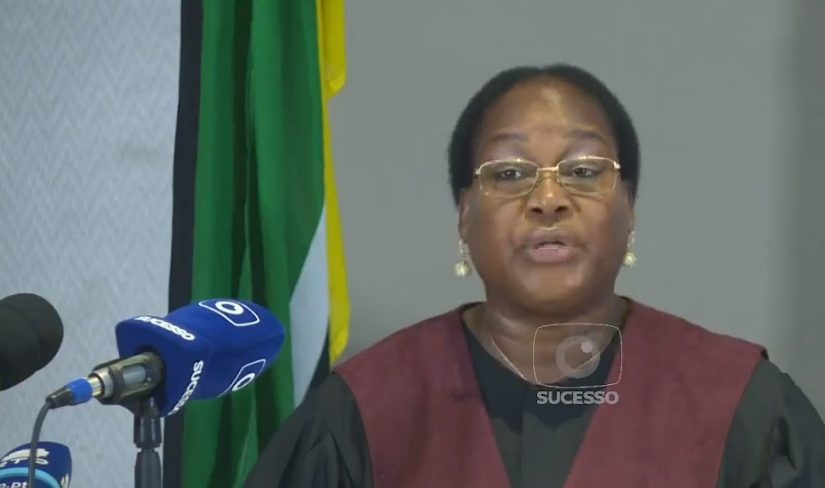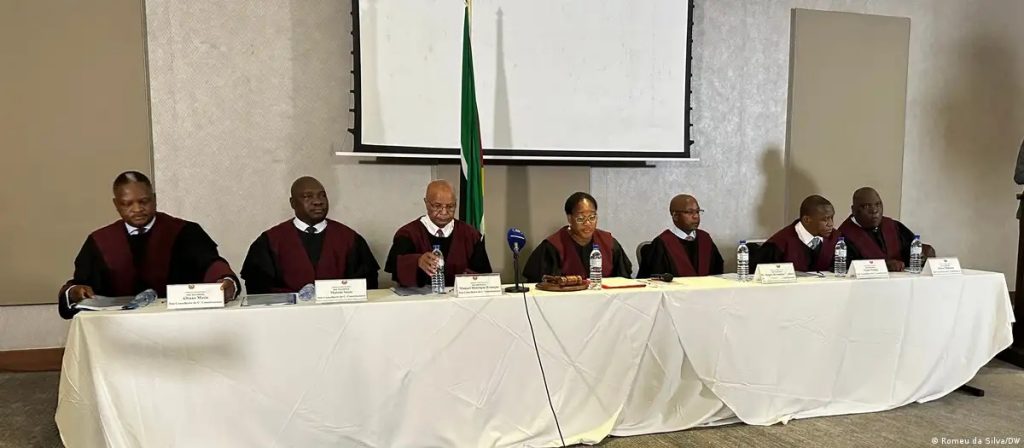Mozambique: President Chapo calls for community- led marine protection and environmental education
Mozambique Elections: Constitutional Council gives 4 remaining municipalities to Frelimo

Screen grab: TV Sucesso Moz
All four municipalities which had repeat elections on 10 December were won by Frelimo with large margins, the Constitutional Council (CC) announced on Saturday morning (30 December). All objections were ignored. The CC confirmed that the CNE is nothing more than a post box, and continued its fight with the Supreme Court and the bar association (Ordem dos Advogados).
In Marromeu the 11 October election had been so bad that the CC ordered an entirely new election in all 41 polling stations. The 10 December rerun was even worse, and the Mais Integriade civil society observer coalition said “The repeat elections in the municipality of Marromeu were marred by serious irregularities that do not allow any institution to declare, with any credibility and certainty, which list was the winner.” Without explanation, the CC declared Frelimo the winner.
The CC also required voting again on 10 December in 18 polling stations of Nacala Porto, 3 in Milange, and 9 in Gurue. Those results were added to the accepted polling stations from 11 October. Frelimo was declared winner in all three municipalities.
As in the CC ruling on the 11 October election, this ruling was supported by the five Frelimo-appointed members and opposed by the two Renamo-appointed members, Manuél Henrique Franque and Albino Augusto Nhacassa. (Acórdão n. 53/CC/2023. All documents are available on https://cconstitucional.org.mz/jurisprudencia/)

In its ruling of 26 October, the National Elections Commission (CNE) said Frelimo won 64 of 65 municipalities, with only Beira going to the MDM. The CC, without explanation, on 23 November took 4 away from Frelimo, and gave Chiure, Alto Moloque and Vilankulo to Renamo. Quelimane was given a divided municipal assembly – Renamo 23, Frelimo 22 and MDM 1. And 4 were still to be determined – and have now been given to Frelimo.
- CC again calls for unified electoral code
“We must reiterate our position on the lack of systematisation and harmonisation of electoral legislation,” the CC said in its decision. “With regard to Electoral Legislation, the Constitutional Council renews the call it has been making in its jurisprudence for the need to systematise and harmonise it, drawing up an Electoral Code. The starting point for this activity could be the consolidation of Electoral Legislation, through a Uniform Electoral Law, This would stabilise the general principles and issues common to all elections; remove repetitive, contradictory, overlapping and outdated provisions; resolve doubts in the interpretation and application of electoral law; facilitate access, understanding and legal certainty; and avoid delays in electoral decision-making.”
The 9 overlapping electoral laws have many disagreements, confusions and outright mistakes (such as the way the number of national parliament seats is calculated). Apparently simple things like the details of going to the district court are not the same for municipal and national elections.
The CC twice called for a unified code in 2009, and there was some consensus including civil society and the parties. But the donor community, which was much more powerful then, suddenly intervened. There was a donor strike in the first three months of 2010 to force the government to ignore the CC. A key ambassador believed he could push through key changes to individual laws before he left in July 2010, which would win him kudos, and that a new unified code would take longer – more time than he had left in Maputo. The government agreed to ignore the CC, and aid resumed in April 2010. But revising the package of individual laws took 4 years, and introduced more inconsistencies.
- Questions over role of district courts, CNE and CC
One area of confusion is that the district tribunals are courts under the Supreme Court (TS) and electoral courts under the CC, and it is not clear which rules apply. The CC says the constitution and laws gives all electoral power to the CC and district courts only evaluate evidence and claims. The CC says they do not have the power to force repeat elections, for example. But in strong public statements, the Supreme Court and bar association (Ordem dos Advogados) says district courts do have more power. Six of the 18 pages of the ruling are taken up with the CC’s rebuttal.
Meanwhile the CC ruling also underlines its view that the CNE is nothing more than a postbox. The National Elections Commission (CNE) quickly passed on the district results from the four municipalities with repeat elections, and made no attempt to validate them. It was just rubber stamped and passed on, and the CNE did not even publish any numbers. The CC “noted with appreciation” this procedure, which leaves the CNE as a mere postbox. But the CC underlined where power lies by saying that there would have been no point for the CNE to check the details since the CC was already considering protests.
- Electronic evidence not accepted
Two protests were rejected by the CNE on Thursday (28 December). The party Nova Democracia appealed against the decision of the CC to hold new votes in only some polling stations in Gurué. This was rejected because its evidence was electronic and the formal protest only gave the link (url) of the evidence. The law, the CC says, requires physical proof. (Acórdão n. 52/CC/2023)
A separate Nova Democracia complaint against “countless irregularities and illegalities” in Gurué was dismissed by the district court, and appealed, with evidence, to the CC. But the CC ruled that the district court was right to reject the appeal because Nova Democracia had not made its first complaint while the irregularities and illegalities were taking place.
The CC said: “all the facts that must be the basis of the appeal must have been analysed and decided by the electoral administration beforehand, because only the failure to uphold the complaint or protest triggers a dispute between the election contestants and the electoral administration.
“If the complaint or protest has not been lodged with the polling station, the provincial electoral commission or the CNE, there is no dispute; if there is no dispute, there is no recourse to the courts. The principle of prior contestation is a fundamental requirement or presupposition for judicial review of voting and partial, district or city and general or national tabulation.” (Acórdão n. 50/CC/2023)












Leave a Reply
Be the First to Comment!
You must be logged in to post a comment.
You must be logged in to post a comment.